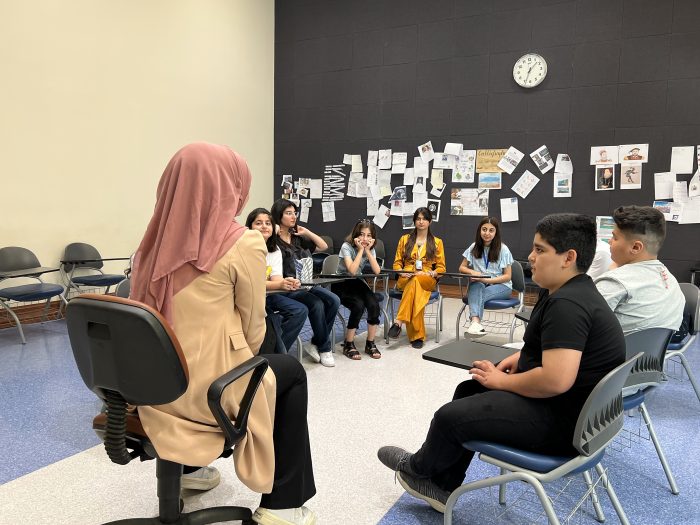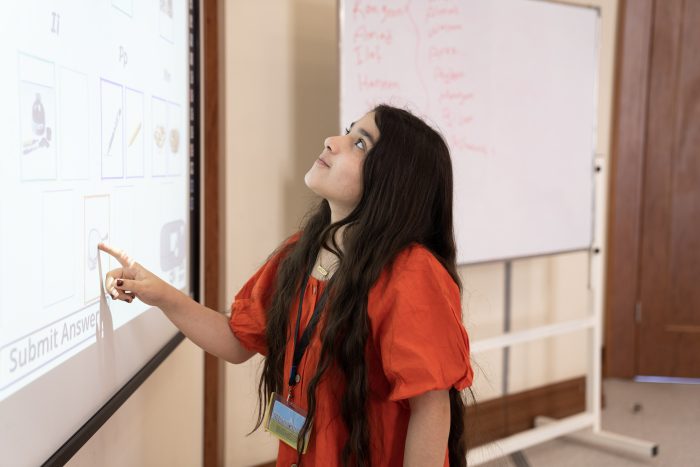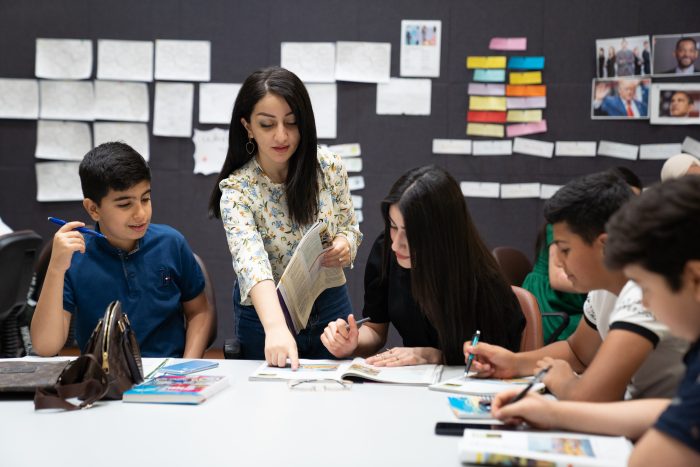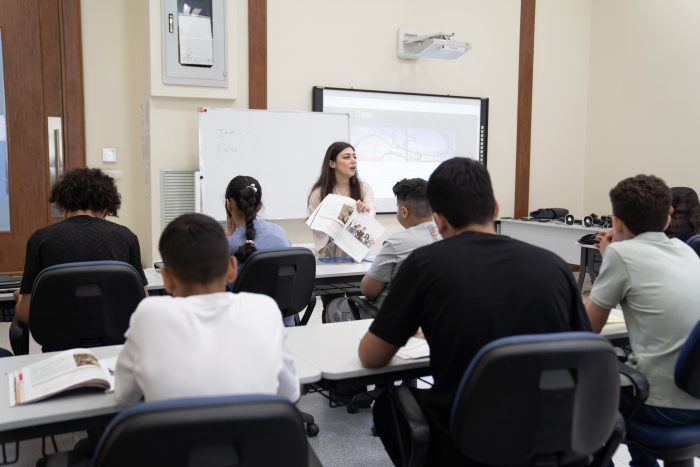CAPA Young Learners Program Classes Enliven the AUK Campus through the Summer
The American University of Kurdistan (AUK) remains open through what is, for most of its young adult student body, summer vacation. It is also summer vacation in Kurdistan for K-12 learners, and many of them converge on the AUK campus to improve their English. The Center for Academic and Professional Advancement (CAPA), which prepares high school graduates for the linguistic and general academic rigors of study at AUK, additionally trains younger students in English over the summer, thereby facilitating their learning of other subjects and overall navigation of an increasingly globalized world. On June 22, AUK Content Writer Michael Collins visited several of CAPA’s Young Learners Program classes to see for himself the progress the students are making; his observations are summarized below.

Both academic and social needs should be addressed in the classroom, and CAPA groups students accordingly. Students are divided into “stages” based on their ages and “levels” based on their English proficiency upon entry. Because of the high demand for CAPA summer courses and the separate groupings to accommodate the diversity of academic and social needs, there are close to 15 classes happening concurrently in the morning. CAPA instructors work hard to inject “fun” into the morning language classes that are the core of the Young Learner Program, and “fun” is an even greater consideration for the afternoon enrichment classes a reduced number of students take.

In a Level 1 class, students were observed building up their English vocabularies while benefiting from extensive visual support. Instead of falling into the teaching trap of just “giving” students the answers or the even worse trap of invariably doing exercises in which there is a single “correct” one, the instructor elicited words from the students starting with a certain letter, and it was remarkable how many words the students knew given their “Level 1” status. There was an activity in which students went to the interactive screen one at a time and dragged images into categories based on their initial letters (for example, the picture of a “net” was to be dragged and dropped under the letter “N”).

The very start of a Level 2 class was observed. There, the instructor opened with a review of the previous day’s lesson, eliciting as much as she could from the students themselves. While involving the students, she put a list of the day’s major activities on the board. The first major activity involved listening to a popular song (with, for spelling reinforcement, the lyrics visible on the screen); students were supposed to write down words that were new to them and then, at the conclusion of the song, share them with the room, so that the instructor or, better yet, fellow students could elucidate their meanings.

One Level 3 class was already in full swing when the Content Writer walked in to observe it. The students were practicing the comparative, pointing out, for example, that elephants are bigger than humans and cheetahs are faster than either. There was a notable “applause culture” in the room, with students praising one another for particularly imaginative statements. The class seemed to be on the verge of making the leap to the superlative when the Content Writer departed. He caught the end of another Level 3 class. There, the instructor was verbally doing final “checks for understanding” of the lesson’s major points. They had apparently been describing people’s appearances in great detail, down to the “dimples.”

A Level 4 class put on full display the advantages of the National Geographic materials CAPA utilizes. Grammatically, students were seeking to master prefixes and suffixes, and the word of the day, built with both a prefix and a suffix, appeared to be “reusable.” Thematically, they were talking about reducing, reusing, and recycling. They watched a video in which a National Geographic worker chronicled her effort to travel to Belize and back without resorting to any single-use plastic. Clearly, then, this lesson was simultaneously supposed to make students better speakers of English and stewards of Earth.

Level 5 students should already have a solid foundation of English, with appreciable skill in all four language domains. The Content Writer got the impression that the Level 5 students he observed did have such skill, as they literally did exercises about exercises – learning about various physical activities. Through dictation (meant to strengthen listening and writing at once), they had to capture and spell correctly terms like “hiking” and “sit-ups.” They also did work on a nicety of English requiring careful practice to master: when to use “do,” “go,” or “play” when talking about physical activities. The writing on the board made it clear they had earlier been discussing the present perfect continuous with “for” and “since” (e.g., “I have been studying with CAPA for four weeks”).

The afternoon enrichment courses are collectively referred to as “CAPA Track classes.” Students are separated into two age groups, and, on the day of the observation, there were three distinct offerings: “Storytelling,” “Sports,” and “Games.” Apart from splitting the students based on age, further accommodations were made for age appropriateness of activities. The younger group told stories through a combination of writing and illustration; the older group sat in a circle and had to add a sentence to the previous person’s contribution, to create in the end a whole-class collaborative work. Younger learners played “musical chairs” and “red light, green light”; older learners could pursue sports like table tennis, billiards, and even chess. The younger students had tons of fun with cards during their gaming session; older students were given a break from the ordinary ban on phones in the classroom, employing their devices as controllers in a competitive online activity synced with the smartboard.

The Center for Academic and Professional Advancement at the American University of Kurdistan takes no summer breaks – and no shortcuts – in educating students. In CAPA Young Learners Program classes, there is the variety necessary for individual expression and the prevention of boredom, but, at the same time, there is the commonality of student-centered approach and a harmonious team atmosphere in the room. The students are “in it” together, shepherded by instructors who are “in it” for the students. It is exactly the kind of environment learners of all ages and abilities need.


